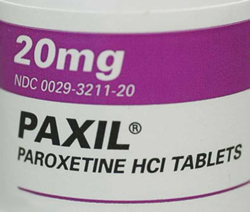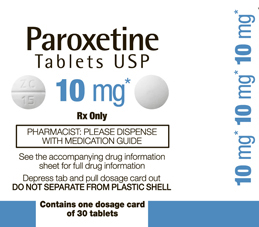Paxil (Paroxetine)
Paroxetine is an antidepressant medication that works in the brain. It is approved for the treatment of major depressive disorder, generalized anxiety disorder, social anxiety disorder, panic disorder, obsessive compulsive disorder, posttraumatic stress disorder, and premenstrual dysphoric disorder, and for vasomotor symptoms associated with menopause.
Symptoms of depression include:
- Depressed mood - feeling sad, empty, or tearful
- Feeling worthless, guilty, hopeless, and helpless
- Loss of interest or pleasure in your usual activities
- Sleep and eat more or less than usual
- Low energy, trouble concentrating, or thoughts of death
- Psychomotor agitation
- Psychomotor retardation
- Suicidal thoughts or behaviors
Generalized Anxiety Disorder occurs when a person experiences excessive anxiety or worry for at least six months. Other symptoms include
- Restlessness
- Fatigue (low energy, feeling tired all the time)
- Difficulty concentrating
- Irritability
- Muscle tension
- Sleep disturbance (difficulty falling asleep or waking up in the middle of the night)
Obsessive Compulsive Disorder occurs when a person experiences the following symptoms at the same time:
- Obsessions (unwanted, recurrent, and disturbing thoughts)
- Compulsions (repetitive, ritualized behaviors that the person feels driven to perform in order to lessen the anxiety produced by the obsessions)

Panic Disorder occurs when a person experiences unexpected and repeated episodes of intense fear. These episodes have physical symptoms including chest pain, shortness of breath, heart palpitations, sweating, dizziness, and nausea. Fear of future episodes is also part of panic disorder.
PTSD occurs when a person experiences a traumatic event (e.g. assault, combat experience) and then later feels on edge; avoids situations that remind them of the event; and experiences flashbacks or nightmares.
Premenstrual dysphoric disorder is a condition where a woman experiences depression, tension, and irritability for a few days prior to menstruation that end when menstruation begins. These symptoms are more severe than those of premenstrual syndrome.
Social phobia/social anxiety disorder is a fear of situations where one may feel as if they are being judged by others. Symptoms include:
- Blushing
- Difficulty talking
- Nausea
- Sweating
- Shaking
Paroxetine may also be helpful when prescribed for irritable bowl syndrome and obsessive-compulsive disorder in children. It means that it hasn't been approved by the Food and Drug Administration for this condition. Your mental health provider should justify his or her thinking in recommending any treatment. They should be clear about the limits of the research around that medication and if there are any other options.
Paxil brand name
Brand Names: Brisdelle, Paxil, Paxil CR, Pexeva
Paxil Generic name
Generic Name: Paroxetine
Buy Paxil
Reasons to buy Paxil:
- Available in a cheaper, generic form.
- Paroxetine (Paxil) Is convenient and can take once a day.
Paxil Prices
The cost for Paxil, depending on the online pharmacy:
- 7.5 mg Paxil oral capsule: from $35 for 30 capsule.
- 10 mg Paxil oral tablet: from $40 for 30 tablet.
- 12.5 mg Paxil oral tablet: from $43 for 30 tablet.
- 20 mg Paxil oral tablet: from $54 for 30 tablet.
- 25 mg Paxil oral tablet: from $71 for 30 tablet.
- 30 mg Paxil oral tablet: from $78 for 30 tablet.
- 37.5 mg Paxil oral tablet: from $109 for 30 tablet.
- 40 mg Paxil oral tablet: from $105 for 30 tablet.
Warnings and Precautions
Do not stop taking paroxetine, even when you feel better. Only your healthcare provider can determine the length of treatment that is right for you.
Missing doses of paroxetine may increase your risk for relapse in your symptoms.
Stopping paroxetine abruptly may result in one or more of the following withdrawal symptoms: irritability, nausea, feeling dizzy, vomiting, nightmares, headache, and/or paresthesias (prickling, tingling sensation on the skin).
Depression is also a part of bipolar illness. People with bipolar disorder who take antidepressants may be at risk for "switching" from depression into mania. Symptoms of mania include "high" or irritable mood, very high self esteem, decreased need for sleep, pressure to keep talking, racing thoughts, being easily distracted, frequently involved in activities with a large risk for bad consequences (for example, excessive buying sprees).
Medical attention should be sought if serotonin syndrome is suspected. Please refer to serious side effects for signs/symptoms.
Contraindications
If you are planning on becoming pregnant, notify your healthcare provider to best manage your medications. People living with MDD who wish to become pregnant face important decisions. Untreated MDD has risks to the fetus, as well as the mother. It is important to discuss the risks and benefits of treatment with your doctor and caregivers. For women who take antidepressant medications during weeks 13 through the end of their pregnancy (second and third trimesters), there is a risk that the baby can be born before it is fully developed (before 37 weeks).
For mothers who have taken SSRIs during their pregnancy, there appears to be less than a 1% chance of infants developing persistent pulmonary hypertension. This is a potentially fatal condition that is associated with use of the antidepressant in the second half of pregnancy. However, women who discontinued antidepressant therapy were five times more likely to have a depression relapse than those who continued their antidepressant. If you are pregnant, please discuss the risks and benefits of antidepressant use with your healthcare provider.
Caution is advised with breastfeeding since paroxetine does pass into breast milk.
How should I take Paxil?
Paxil is usually taken 1 time per day with or without food.
Typically patients begin at a low dose of medicine and the dose is increased slowly over several weeks.
The dose usually ranges from 10 mg to 40 mg (50 mg for controlled release). Only your healthcare provider can determine the correct dose for you.
If you are taking paroxetine for PMDD, it can be taken once daily (everyday) or intermittently (usually starting 14 days prior to menstruation through the first full day of menses of each cycle). Discuss this with your prescriber.
The liquid should be measured with a dosing spoon or oral syringe which you can get from your pharmacy.
The controlled release form should be swallowed whole. It should not be chewed, crushed, or broken.
Consider using a calendar, pillbox, alarm clock, or cell phone alert to help you remember to take your medication. You may also ask a family member or friend to remind you or check in with you to be sure you are taking your medication.

If you miss a dose of paroxetine, take it as soon as you remember, unless it is closer to the time of your next dose. Discuss this with your healthcare provider. Do not double your next dose or take more than what is prescribed. Avoid drinking alcohol or using illegal drugs while you are taking antidepressant medications. They may decrease the benefits (e.g., worsen your condition) and increase adverse effects (e.g., sedation) of the medication.
Sleep, energy, or appetite may show some improvement within the first 1-2 weeks. Improvement in these physical symptoms can be an important early signal that the medication is working. Depressed mood and lack of interest in activities may need up to 6-8 weeks to fully improve.
Antidepressants
Sleeping Pills
Anxiety
Depression Basics
Bipolar Disorder
Men Depression
Women Depression
- Depression in Women as a common problem
- Social & Cultural causes of Women Depression
- Female Depression & Suicide
- Why Women Depression is More Common Than Men
- Top 10 Causes of Female Depression
- How Friends & Family Can Help a Depressed Woman
- List of Sources Depressed Women Get Help
- Female Depression Symptoms
- More Female Depression Symptoms
